Discover The Napoleonic Quarterly
The Napoleonic Quarterly

The Napoleonic Quarterly
Author: Quartermaster Productions
Subscribed: 122Played: 5,837Subscribe
Share
© Quartermaster Productions
Description
Taking the epic conflicts of the French Revolutionary and Napoleonic Wars three months at a time. Each episode features interviews with leading historians of the period - covering the campaigns, diplomacy and political dramas of an extraordinary 24 years.
158 Episodes
Reverse
A conversation with Barbara Stollberg-Rilinger, Professor Emerita of Early Modern History at the University of Munster and Rector of the Institute for Advanced Study in Berlin. Germany is becoming increasingly important to this podcast, which is why we're digging into another aspect of this fascinating part of Europe. Dualism and dissolution; between fealty and federation; the unravelling of the Holy Roman Empire and a tumultuous period. All setting the stage for Napoleon Bonaparte...This discussion:- Explores the complexities and contradictions of the Holy Roman Empire in the late 18th and early 19th centuries, including its structure, political dynamics, and the concept of legitimacy.- Discusses the dualism and rivalry between Austria and Prussia, and how their ambitions and actions contributed to the fragmentation and eventual dissolution of the Empire.- Examines the significance of symbolism, rituals, and ceremonies in sustaining imperial power—and the ways these traditional forms were both maintained and undermined in practice.- Looks at cultural and intellectual responses to the era’s upheavals, including the reactions of figures like Goethe, Schiller, and Hegel to the French Revolution and emerging German nationalism.- Considers the impact of Napoleon and the mediatisation of the Empire, questioning whether Napoleon was the executioner of the Holy Roman Empire or if its internal weaknesses had already sealed its fate.Help us produce more episodes by supporting the Napoleonic Quarterly on Patreon: patreon.com/napoleonicquarterly
A conversation about a legendary moment in United States history between James Quint, Director of the Old Cowtown Museum in Wichita, Kansas, and Peter Kastor, Professor of History and American Culture Studies at Washington University in Saint Louis. The episode dives deep into the context and significance of the Lewis and Clark Expedition, from the initial uncertainty faced by the United States after acquiring the Louisiana Purchase to the quest for knowledge and trade routes in unknown territory.Discussion highlights the pivotal roles of indigenous nations and French-Canadian traders in shaping the expedition’s progress, including the crucial diplomatic and trading relationships necessary for survival.The complex dynamics of the Corps of Discovery are explored, touching on its diverse and multicultural makeup, the contributions of key figures like Sacagawea and York, and the evolving perspectives on Native American diplomacy.The challenges and logistical feats of the expedition—navigating vast rivers, crossing the Rocky Mountains, and surviving harsh winters—are described alongside the extraordinary documentation kept through journals and maps, which became invaluable historical sources.The legacy of Lewis and Clark is examined, not only as a story of exploration but as a lens into America’s expansion, scientific ambition, the consequences for native peoples, and how these events continue to shape public memory and interpretation in museums and beyond.Help us produce more episodes by supporting the Napoleonic Quarterly on Patreon: patreon.com/napoleonicquarterly
1804. April... May... June... three months in which the British are facing an uphill struggle in building another coalition against the French... The Revolution takes its final step as Napoleon Bonaparte is to be granted the imperial dignity... and in the Caucasus, a determined Russian general is making real progress. This is episode 50 of the Napoleonic Quarterly... covering three months in which France makes the decision to move to Empire.[06.00] - Headline developments[18.10] - Adam Zamoyski on European diplomacy in 1804[46.40] - Philip Dwyer on the decision to make Napoleon Bonaparte an emperor[1.06.15] - Giorgi Tchkadua on Russian efforts to establish control of the CaucasusHelp us produce more episodes by supporting the Napoleonic Quarterly on Patreon: patreon.com/napoleonicquarterly
"It was like a soap opera," Adam says of the Congress of Vienna near the end of this interview episode. That just about sums up his unique perspective on the whole Napoleonic period, as reflected throughout this discussion - a fascination with personalities and the impact individuals can have on human history, contextualised by an understanding of the messiness of diplomacy and power politics which defined the long 18th century. 01.20 - Izabela The Valiant, Adam's most recent book10.00 - How Adam's views about the biggest characters of 1792-1815 have developed over the past five years18.00 - Was Wellington over-rated28.00 - Czartoryski, Alexander's first foreign minister and a key figure for Poland36.00 - Power politics in eastern Europe - Germany, Poland, Austria, Russia and France 52.00 - Napoleon's Spanish calculations56.50 - The Congress of Vienna's negative impact on the ideals of monarchyHelp us produce more episodes by supporting the Napoleonic Quarterly on Patreon: patreon.com/napoleonicquarterly
Giorgi Tchkadua of Ilia State University in Georgia, PhD candidate under our own Alexander Mikaberidze, helps unpack the multiplicity of riddles which makes up the fascinatingly complex power dynamics in the Caucasus before, during and after the 1792-1815 period. In this episode you'll learn: How Russian expansion into the Caucasus took place following failures by their Ottoman and Persian rivalsWhy the patchwork of kingdoms and khanates in the region proved so elusive for imperial dominationAnd above all, how from the perspective of those living in the Caucasus the big powers were themselves being played - in a local struggle for power even more compelling than you'd think.Help us produce more episodes by supporting the Napoleonic Quarterly on Patreon: patreon.com/napoleonicquarterly
Prof Emeritus Alan Forrest of the University of York, biographer of Napoleon, is back in conversation with Alex Stevenson to give his appraisal of imperial France as it was in 1804-05. Featuring - France’s shift from revolutionary chaos to Napoleonic stability in 1804-1805, with the rise of executive power and curtailment of parliamentary influence.Ongoing security threats and conspiracies from both Jacobins and royalists, including assassination plots and political purges.The challenges and social impact of conscription, causing widespread resentment, draft dodging, and community resistance.Transformation of the French economy and society under the pressures of renewed war, British blockade, and loss of overseas colonies.The emergence of new administrative strengths and legal reforms, alongside the growing reach of centralized state authority into everyday life.Help us produce more episodes by supporting the Napoleonic Quarterly on Patreon: patreon.com/napoleonicquarterly
1804. January… February… March… Three months in which Napoleon acts ruthlessly by abducting and killing a royalist figurehead... Both Haiti and Louisiana face momentous questions about their future... And in the forested, rugged terrain of the Balkans, a figure called Karadjordje rises to challenge the Ottomans. This is episode 49 of the Napoleonic Quarterly - covering three months in which the murderous shedding of more royal blood sends shockwaves across Europe.[15:18] - Headline developments[34:30] - Peter Kastor on the Louisiana Purchase and Haiti[58:50] - Alan Forrest on the Cadoudal plot, the abduction of the Duc D'Enghien and the conspiracists mindset[1:19:20] - Michael Talbot on Karadjordje and the Serbian uprisingHelp us produce more episodes by supporting the Napoleonic Quarterly on Patreon: patreon.com/napoleonicquarterly
April 1796 - time for another critical chapter in the young Napoleon Bonaparte's legendary Italian campaign, brought to you once again by our Battlefield Despatches dream team. Clemens Bemmann presents; Rick Schneid is our battlefield correspondent; John Gill is with the Austrian command; and Graeme Callister is on Bonaparte's staff to provide the French perspective. Maps x2 can be found here.Produced by Alex Stevenson, with audio editing support from Sam Loose.Help us produce more episodes by supporting the Napoleonic Quarterly on Patreon: patreon.com/napoleonicquarterly
Bernie Campbell is joined by Rachel Blackman-Rogers of King's College London and Olivier Aranda of the University of Western Brittany to discuss naval strategy in the Mediterranean theatre in the 1790s, with a particular emphasis on the Battle of the Nile.The episode explores the strategic importance of the Mediterranean for both France and Britain during the Revolutionary and Napoleonic periods, particularly focusing on the lead-up to the French invasion of Egypt and the Battle of the Nile. It highlights how each nation’s naval priorities shifted over the 1790s depending on political alliances and military objectives.Olivier Aranda explains the French dilemma of having to split their naval forces between the Atlantic and Mediterranean, and how this dual-front created both opportunities and problems for the French navy. The discussion contrasts the fortunes of France’s Mediterranean (Toulon) and Atlantic (Brest) fleets, illustrating the divergent outcomes and strategic thinking.Rachel Blackman-Rogers provides insight into British strategy, emphasizing the significance of trade, power projection, and political influence in the Mediterranean. The episode also discusses Britain’s reliance on bases, alliances with smaller regional powers, and the critical impact of controlling Mediterranean routes for economic and diplomatic reasons.Both speakers detail the roles and shifting alliances of other Mediterranean powers—such as Spain, Naples, Venice, the Ottoman Empire, and the Barbary States—influencing French and British strategies. The complexity of these ever-shifting diplomatic relationships is shown to be a constant challenge for both major powers.The consequences of the Battle of the Nile are examined in terms of their profound impact on French and British strategic options. The destruction of the French fleet isolated Napoleon in Egypt, shifted the naval initiative firmly to Britain, and set the stage for changing coalitions and further military campaigns in the region.Help us produce more episodes by supporting the Napoleonic Quarterly on Patreon: patreon.com/napoleonicquarterly
Yes, it's the planning meeting once again - this is the third go in our festival of bureaucracy, the critical discussion which sees us sort out what each of our main episodes should include as topics for their three segments. The years 1804 and 1805 are exciting times for the podcast, as we actually hit the Napoleonic Wars proper. All roads lead to the fabled episode 56, covering the final quarter of 1805...Alex Stevenson hands over the presenting reins to Josh Provan, whilst Alex Mikaberidze and Rick Schneid (in Charles' absence) lead the debate about what we should include. Spoiler: we are going to talk about Austerlitz. And Trafalgar. Not in that order. Help us produce more episodes by supporting the Napoleonic Quarterly on Patreon: patreon.com/napoleonicquarterly
1803. October… November… December… Three months in which French forces wave the white flag on Saint-Domingue... In Washington the Louisiana Purchase gets a green light from Congress - without working out the detail... And in India a series of defeats for the Marathas force Scindia to the negotiating table. This is episode 48 of the Napoleonic Quarterly - covering three months in which the Haitian Revolution finally reaches its culmination. [11.10] - Headline developments[32.30] - Marlene Daut on independence for Haiti[53.50] - Peter Kastor on the Louisiana Purchase[1.20.00] - Ravindra Rathee on India, the Treaty of Deogaon and the end of the Second Anglo-Maratha WarHelp us produce more episodes by supporting the Napoleonic Quarterly on Patreon: patreon.com/napoleonicquarterly
This episode offers a deep dive into the pivotal Battle of Assaye fought on September 23, 1803, a clash that shaped British dominance in India and forged the reputation of Arthur Wellesley—better known to history as the Duke of Wellington. Host Clemens Bemmann welcomes a special panel to explore the campaign, armies, personalities, and chaos that defined one of the most dramatic battles on the Indian subcontinent during the Napoleonic era. Josh Provan is the battlefield correspondent; Zack White is the East India Company expert; Andy Copestake is the Maratha army expert. Featuring: The Maratha Confederacy: European mercenaries, regular brigades, and command strugglesBritish Army composition: The rise of Arthur Wellesley, Indian sepoys, and logistical prowessLead-up to Assaye: The Treaty of Bassein, Maratha-British diplomacy, and campaign maneuversThe battlefield: Terrain, climate, and strategic optionsThe battle unfolds: Surprise encounters, flanking maneuvers, massed artillery, discipline under fireLeadership and morale: Command breakdowns vs. individual heroism on both sidesThe outcome: Heavy losses, psychological aftermath, and the reshaping of Indian and British military futuresThe panel considers how the mix of European mercenaries and Indian soldiers within the Maratha army both enhanced and undermined its fighting ability at Assaye; what the leadership style of Arthur Wellesley at Assaye—and the razor-thin margin of his victory—reveal about the nature of military success and reputation in the colonial era; and, in a battle filled with confusion, split-second decisions, and shifting morale, the role of discipline, training, and individual initiative in determining battles like these.Help us produce more episodes by supporting the Napoleonic Quarterly on Patreon: patreon.com/napoleonicquarterly
Rachel Blackman-Rogers and Catherine Scheybeler, both of King's College London, join Alex Stevenson for an in-depth look at one of Horatio Nelson's most famous formative battles. The Royal Navy in the 1790s was always going to do well against the Spanish Navy, but it was Nelson's decisive use of initiative - and then the double-boarding to capture not one but two Spanish ships his Captain had become entangled with - which marked this battle out. This episode also features written contributions by Rif Winfield, co-author of Pen and Sword's Warships In The Age of Sail series. Thank you to Rif for taking part. You can read Rif's contributions in full on Patreon.Help us produce more episodes by supporting the Napoleonic Quarterly on Patreon: patreon.com/napoleonicquarterly
Josh Provan is joined by Charles Esdaile and Alex Mikaberidze, with Alex Stevenson and Clemens Bemmann along for the ride, to discuss some military topics in this Q&A episode. Including: [2:00] - The Royal Navy PR machine[10:11] - Elite units of the Napoleonic Wars[22:30] - Suvorov in 1799[34:00] - Feedback on our battle episodes
1803. July… August… September… Three months in which the Maratha forces are defeated by Arthur Wellesley at Assaye… Hanover becomes the latest victim to Napoleon Bonaparte’s forces… And there’s another attempted uprising in Ireland. This is episode 47 of the Napoleonic Quarterly - covering three months in which the British and their sepoys take another step towards Empire on the Indian subcontinent.[07:08] - Headline developments[20:17] - Michael Rowe on the French invasion of Hanover[39:45] - Ravindra Rathee on the end of the Second Anglo-Maratha War[1:01:00] - Ciaran McDonnell on Emmet’s uprising
Alex Stevenson sits down with Martin Howard, author of the newly published 'The Napoleonic Wars: A Medical History' (March 2025). Together, they dive into the real and often overlooked medical realities of the Napoleonic Wars.The discussion explores how disease, especially yellow fever and malaria, decimated armies in places like the Caribbean, frequently eclipsing battlefield casualties. Martin Howard explains the psychological, social, and strategic impact of mass disease, highlighting how military leaders and soldiers navigated the ever-present threat of death and illness during this era. The episode also delves into medical advancements, the organization of military healthcare, and personal anecdotes that bring the human cost—and resilience—of the period into sharper focus.Help us produce more episodes by supporting the Napoleonic Quarterly on Patreon: patreon.com/napoleonicquarterly
Josh Provan is joined by Charles Esdaile and Alex Mikaberidze, with Alex Stevenson and Clemens Bemmann along for the ride, to discuss all things politico-diplomatic in this Q&A episode. Including: 02:30: British dirty tricks (Warning: Grumpy Charles alert)24:00: French brinkmanship32:00: Poland's prospects36:32: Napoleonic ghost storiesLink: Napoleon's little red man41:00: Listener feedback
Seven years before the Napoleonic Quarterly got going properly, a single interview was recorded in 2013 - in the Palace of Westminster, of all places. A young Alex Stevenson, then a lobby journalist, spoke to Professor David Andress of the University of Portsmouth about his new book, 'The Savage Storm - Britain on the brink in the age of Napoleon' (it was subsequently retitled 'Beating Napoleon' - for obvious Bonaparte-googling reasons). David kindly returned to the podcast once it hit its stride in 2020, but it's a great pleasure to finally get around to releasing this outlier. Twelve years might be some sort of record...Quartermasters - keep a look out on Patreon for more from this interview from David, where he discusses the situation in the first half of 1803.Help us produce more episodes by supporting the Napoleonic Quarterly on Patreon: patreon.com/napoleonicquarterly
1803… April… May… June… Three months in which war once again breaks out between Britain and France… American negotiators worrying about Louisiana’s future get an unexpected offer from the First Consul… And on Saint-Domingue, General Jean-Jacques Dessalines unifies resistance to the struggling French expedition.This is episode 46 of the Napoleonic Quarterly - covering three months which sees the beginning of what will become known as the Napoleonic Wars.[04:25] - Headline developments[16:25] - Graeme Callister on the resumption of war between Britain and France[39:40] - Peter Kastor on the Louisiana Purchase[1:01:20] - Marlene Daut on the Arcahaie Agreement, the anti-French slide and progress towards Haitian independence on Saint-Domingue
Liam Gauci, Senior Curator at the Malta Maritime Museum in Valletta, returns for another conversation about Maltese history, this time with the goal of planning a future visit by the Napoleonic Quarterly to the 'crossroads of the Mediterranean'.This episode is sponsored by Heritage Malta, whose support for the podcast is enormously appreciated. Liam's book Morte o Fortuna: Corsairs in Malta 1747-1798 is out now.


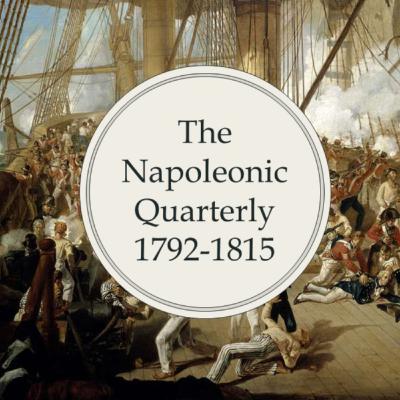
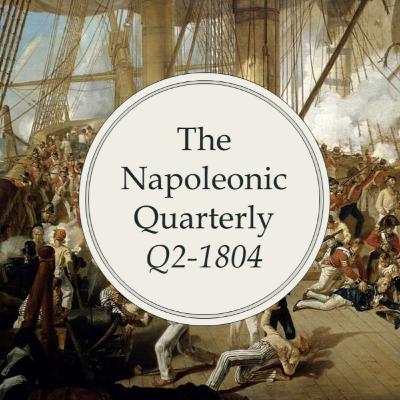
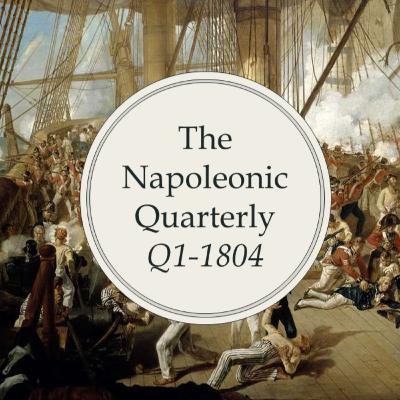
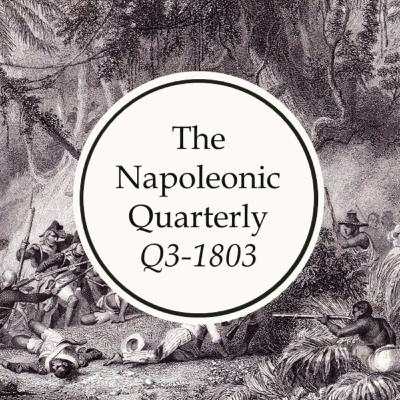
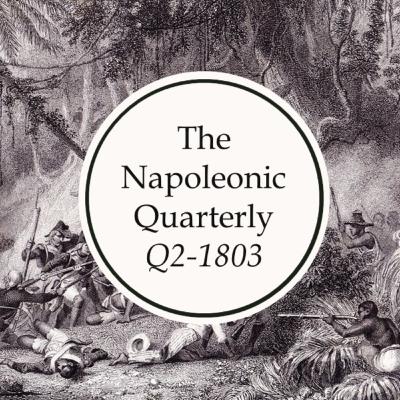



This episode is friggin phenomenal. It is the best conversation of Russian containment I have heard since I read Kissenger's "Diplomacy." I particularly enjoyed the bit upon how the Congress of Vienna was formed. Also, the Baltic. Always the Baltic with Russia.